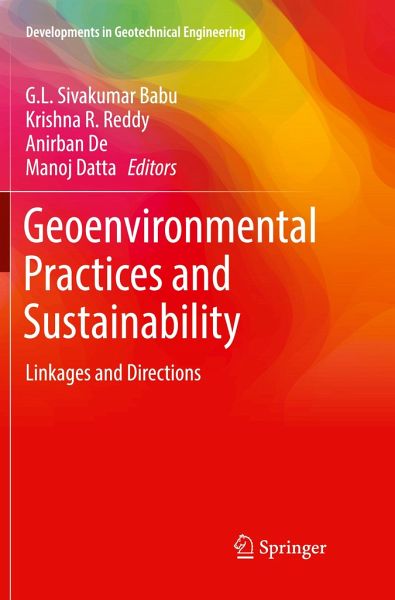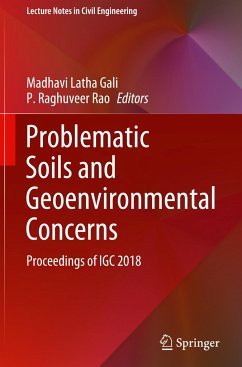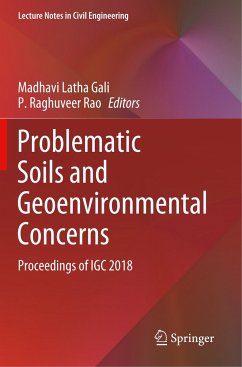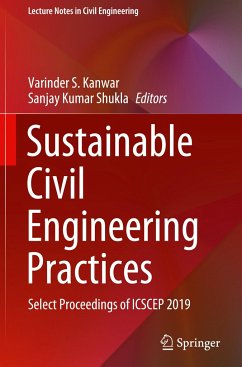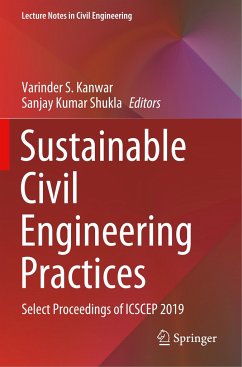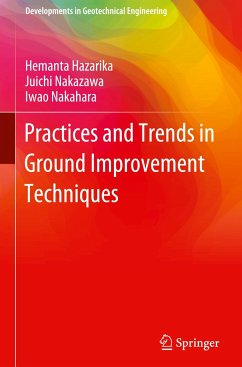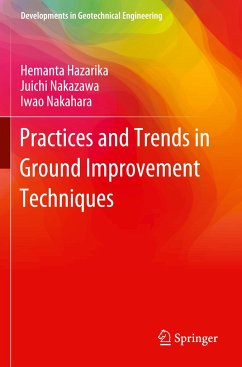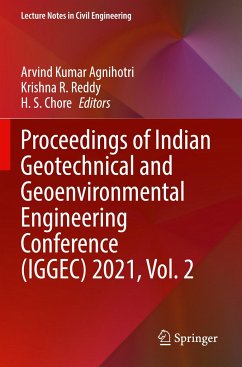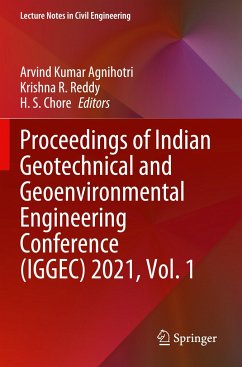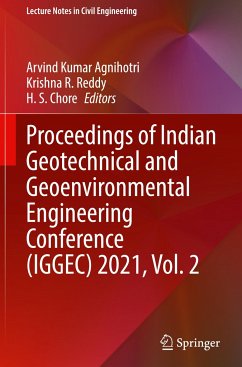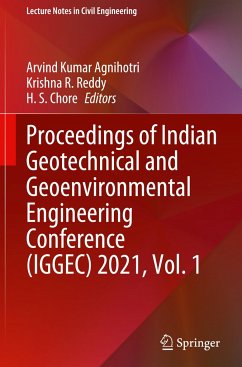G L Sivakumar Babu completed his Ph.D.(Geotechnical Engineering) in 1991 from Indian Institute of Science, Bangalore, India, after earning his Masters Degree (Soil Mechanics Foundation Engg.) in 1987 from Anna University, Madras and B.Tech. (Civil Engineering) in 1983 from Sri Venkateswara University, Tirupati. He worked in Central Road Research Institute and International Airports Authority of India New Delhi. He joined Indian Institute of Science in 1997, where his teaching and research activities include courses on Geomechanics, Soil investigations, risk and reliability applications in Civil Engineering, Pavement Engineering, Geosynthetics, and Ground Improvement. He is Editor-in-Chief of the Indian Geotechnical Journal and is Editorial Board Member of 1) Journal of Hazardous, Toxic, and Radioactive Waste, ASCE, 2) International Journal of Geomechanics, ASCE 3) International Journal of Georisk -Assessment and Management of Risk for Engineered Systems and Geohazards, Taylor & Francis Group, and 4) International journal of systems assurance engineering and management, Springer Publications, 5) International Journal of Geosynthetics and Ground Engineering and Ground Improvement, Journal of Institution of Civil Engineers, UK (during 2006 to 2013). He is the Governor of Region 10, ASCE, Ex-President of ASCE (India Section), a member of Sectoral Innovation Council, Ministry of Road Transport and Highways and Highway Research Board (Identification, Monitoring and Research Application) Committee, Indian Roads Congress, New Delhi. He worked as Humboldt Fellow & Visiting Scientist in Germany during June 1999- July 2000 and as Visiting Scholar, Purdue University, Lafayette, USA during 2/95 - 2/96. He is presently the Chairman, International Technical Committee (TC-302) on Forensic Geotechnical Engineering (FGE) of International Society for Soil Mechanics and Geotechnical Engineering (ISSMGE) and served as its secretary during 2005-2009 and 2009-2013. He was a member in International Technical Committee (TC-32) on Risk assessment in Geotechnical Engineering during 1997-2001 and 2001-2005. He is a Fellow of ASCE, Life Member of Indian Roads Congress, Fellow of Institution of Engineers India, Fellow of Indian Geotechnical Society, Fellow of Association of Consulting Engineers (ACCE). He has guided a number of students for research degrees (Ph.D and M. Sc (Engg.) and wrote a book on soil reinforcement and geosynthetics, edited six books and proceedings and has over 200 publications to his credit in journals and conferences of international repute. He has received several awards for his work such as best PhD thesis in geotechnical Engineering in India from Indian Geotechnical Society, Humboldt fellowship from Germany, DST Boyscast Fellowship, Young Engineer from Central Board of Irrigation and Power, New Delhi and a few awards for best papers from ASCE and Indian Geotechnical Society. Dr. Krishna R. Reddy is a Professor of Civil and Environmental Engineering, the Director of Sustainable Engineering Research Laboratory (SERL), and also the Director of the Geotechnical and Geoenvironmental Engineering Laboratory (GAGEL) in the Department of Civil and Materials Engineering at the University of Illinois at Chicago (UIC). He has over 25 years of research, teaching and consulting experience within the broad fields of civil, geotechnical, materials and environmental engineering, addressing the nexus among sustainability, resiliency, infrastructure, water, energy, and the environment in urban setting. His research expertise includes: (1) environmental remediation of soils, sediments, groundwater, and stormwater; (2) solid and hazardous waste management and landfill engineering; (3) engineering applications of waste/recycled materials; (4) life cycle assessment and sustainable engineering; and (5) geotechnical engineering. His research is funded by the U.S. National Science Foundation, the United States Environmental Protection Agency, several prominent state and local government agencies, and industries. His research includes laboratory studies, field experiments, and computer modeling, ultimately leading to practical solutions to the real-world problems. He is the author of three books: (1) Geoenvironmental Engineering: Site Remediation, Waste Containment, and Emerging Waste Management Technologies, (2) Electrochemical Remediation Technologies for Polluted Soils, Sediments and Groundwater, and (3) Sustainable Remediation of Contaminated Sites. He is also author of 182 journal papers (with h-index of 42 and number of citations 6149), 15 edited books and conference proceedings, 10 book chapters, and 170 full conference papers. Dr. Reddy has given 160 invited presentations in the U.S.A. and 15 other countries (Canada, U.K., Germany, France, Spain, Italy, India, Sri Lanka, China, Hong Kong, Thailand, South Korea, Japan, Brazil and Colombia). He has served or currently serves as an Associate Editor or Editorial Board Member of over 10 different journals, including the ASCE Journal of Geotechnical and Geoenvironmental Engineering, the ASTM Geotechnical Testing Journal, the ASCE Journal of Hazardous, Toxic and Radioactive Waste, the Journal of Hazardous Materials, among others. He has also served on various professional committees, including the Geoenvironmental Engineering Committee and Technical Coordinating Council of Geo-Institute (GI) of the American Society of Civil Engineers (ASCE) and the Environmental Geotechnics Committee of International Society of Soil Mechanics and Geotechnical Engineering (ISSMGE). He has received several awards for excellence in research and teaching, including the ASTM Hogentogler Award, the UIC Distinguished Researcher Award, the University of Illinois Scholar Award, and the University of Illinois Award for Excellence in Teaching. He is a Fellow of the American Society of Civil Engineers (FASCE), a Diplomateof Geotechnical Engineering (DGE), and a Board Certified Environmental Engineer (BCEE). He is also a registered Professional Civil Engineer (PE) and an EnvisionTM Sustainability Professional (ENV SP). Dr. Anirban De is an Associate Professor and Chairman of Civil and Environmental Engineering Department at Manhattan College, located in New York City. Prior to joining his current position, Dr. De served as a Project Engineer in a major geoenvironmental engineering firm, where he was responsible for tasks ranging from site characterization and design to construction and post-closure monitoring of municipal solid waste and hazardous waste landfills. He has over twenty five years of experience performing analyses and design in the field of geotechnical and geoenvironmental engineering. His current research interests include design of geosynthetic systems, site characterization, geotechnical centrifuge modeling, and settlement of landfills. Additionalareas of research include physical and numerical modeling of high strain rate loading, such as effects of blasts and penetrations. His professional specialty is the design of geotechnical and geosynthetic components for a variety of geotechnical and geoenvironmental applications, as well as behavior of geotechnical systems under seismic, blasts, and other types of dynamic loading. He has authored one book on Geotechnical Site Characterization and numerous papers published in peer-reviewed journals and conference proceedings. He has served as a Principal Investigator (PI) or co-Principal Investigator (co-PI) on multiple projects sponsored by the National Science Foundation (NSF), in geotechnical engineering, as well as in engineering education. He has served on various professional committees, including the Geotechnical Committee of the ASCE Metropolitan New York Section and the Geoenvironmental Engineering Committee of Geo-Institute (GI) of the American Society of Civil Engineers (ASCE). Dr. De is a Fellow of the American Society of Civil Engineers (FASCE) and a registered Professional Civil Engineer (PE) in the states of California and New York. Dr. Manoj Datta is currently Professor and Head of Civil Engineering Department at IIT Delhi where he has been teaching and conducting research since 1980. He has also held the office of Director of PEC University of Technology at Chandigarh and of Dean (Alumni & International Programmes) at IIT Delhi. His current areas of interest include environmental geotechnics, landfills, ash & tailings impoundments, embankments & dams, ground improvement, energy geotechnics, foundation engineering, education, accreditation and rankings. He has edited four books in the area of geoenvironmental engineering and co-authored a text book titled "Geotechnical Engineering" with Prof. S.K Gulhati. He has been associated with the Central Pollution Control Board, Ministry of Environment and Forests as well as Ministry of Urban Development in framing of guidelines and design manuals for Municipal Solid Waste landfills and Hazardous Waste landfills. He has received five best-paper awards of the Indian Geotechnical Society. He was awarded the IGS (Delhi Chapter) Leadership Award in July 2008. He delivered the prestigious IGS Annual Lecture in 2011 at Kochi.
